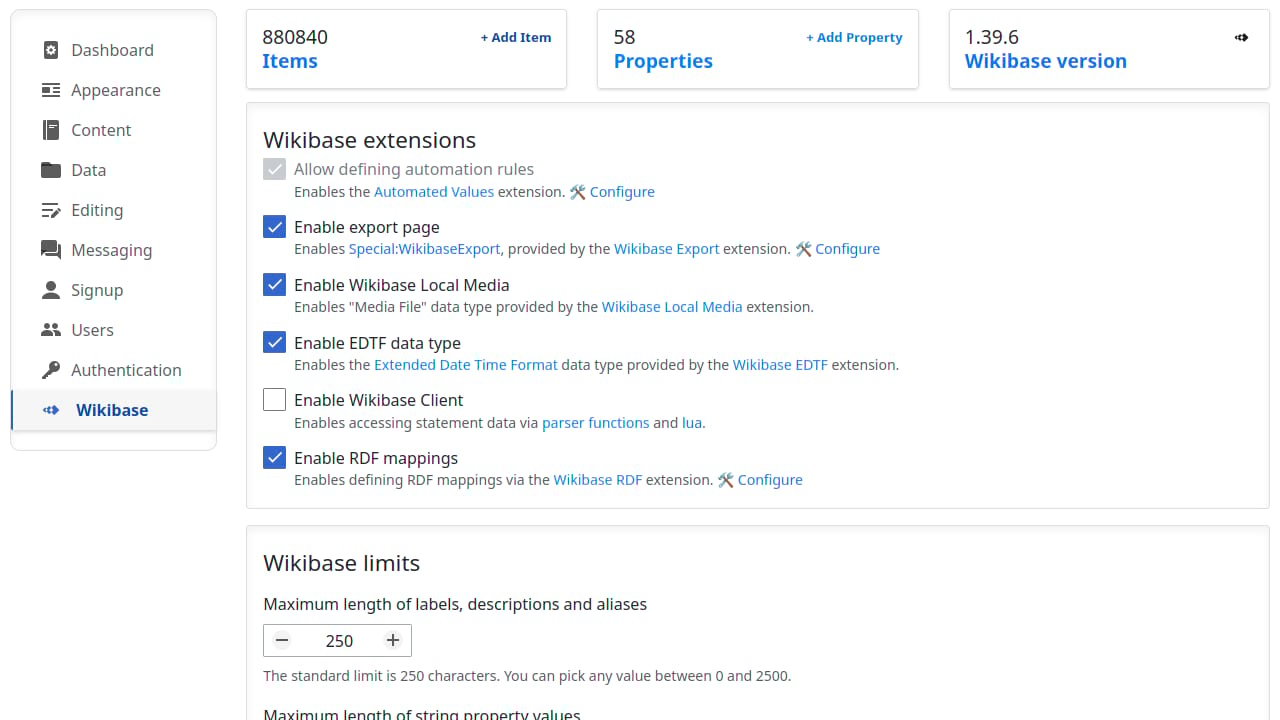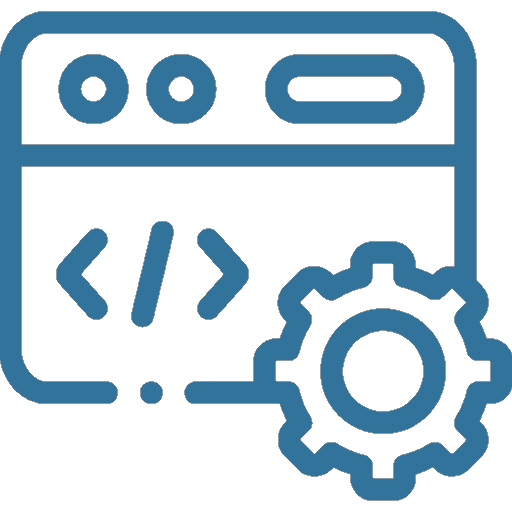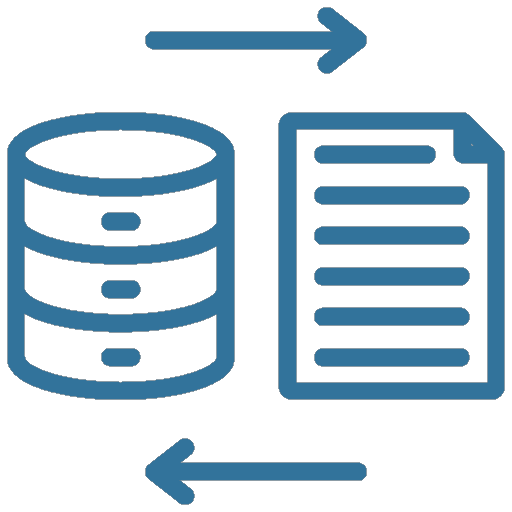Automated Values
Define rules to automatically set labels or aliases based on Statement values

On this page
External links
Automated Values for Wikibase
Enforce consistent labels and aliases for your Wikibase via automation rules.
Define rules to automatically set labels or aliases on your Wikibase items based on the values of your Statements. For instance, combine the values of first and last name Statements into a label on all Items that are "instance of" Person.
Automated Values supports multilingual wikis, conditional rules that only apply to a subset of your data, and Wikibase qualifiers.
The Automated Values extension is particularly useful in reference data systems, in authority files, for vocabulary management, and for managing biographical data.
Professional Wiki created Automated Values. We are Wikibase developers that provide professional Wikibase software development and Wikibase hosting.
We thank das Ministerium für Kultur in Luxemburg for funding initial development.
Nutzungsdokumentation
The core building block of this extension are so-called "Rules". These rules are applied on every edit.
You can read the bellow step-by-step explanation or look immediately at example.json.
A Rule consists of zero or more Entity Criteria, which allow you to specify which Wikibase entities the Rule applies to. For instance "all entities where P1 is Q1", which might translate to "all entities instanceof Person".
{
"when": [
{
"statement": "P1",
"equalTo": "Q1"
}
]
}A rule can also have zero or more Build Specifications. These describe how to automatically build values on matching Entities, and which languages to update. They are available both for Labels and Aliases.
{
"buildLabel": {
"en": {
"P2": "$"
}
},
"buildAliases": {
"*": {
"P5.P3": "President ",
"P5": "$",
"P5.P4": ", $"
}
}
}
Rules can be defined on page MediaWiki:AutomatedValues.
Alternatively, they can be defined in LocalSettings.php,
see the PHP Configuration section.
To define rules for your wiki, simply head over to MediaWiki:AutomatedValues and create the page.
This page only accepts JSON that adheres to the JSON Schema.
If you enter invalid JSON, the page will refuse to save your changes.
Editing of pages in the MediaWiki namespace, which includes MediaWiki:AutomatedValues,
is likely restricted to users with elevated permissions. By default, MediaWiki restricts editing in this namespace
to people with the editinterface right. For more information, go to the page
Special:ListGroupRights#Namespace_restrictions on your wiki.
You can find a complete and valid example of a list of Rules,
that could be placed on MediaWiki:AutomatedValues,
at example.json.
Supported Entity Criteria
At the moment it is only possible to check equality of statement main values, and only for Properties of type String or EntityId.
A Rule can contain multiple Entity Criteria, in which case they all need to match for the Rule to be applied. A Rule can also contain no Entity Criteria, in which case it will be applied to all Entities.
Build Specifications
Build Specifications are essentially templates that describe how to build the values.
You can have different Build Specifications for different languages:
{
"buildLabel": {
"en": {
"P2": "$"
},
"de": {
"P3": "$"
}
}
}
You can also specify * instead of a language code,
in which case the Build Specification will be applied to all default languages.
See the Configuration section for how to set the default languages.
If the default languages are not set, * will be ignored.
{
"buildLabel": {
"*": {
"P2": "$"
},
"de": {
"P3": "$"
}
}
}
The $ symbol is replaced by the Main Value of the first Statement with the specified Property.
Currently only strings are supported. Preferred Statements will be used over those with a Normal rank.
If there is no matching Statement, that part of the value is omitted.
If the resulting value is an empty string, it will be ignored.
It is possible to combine multiple values and to include whitespace and other characters.
{
"de": {
"P3": "$ ",
"P4": "$",
"P5": ", $"
}
}
Assuming P4 is foo, P5 is bar and there not being a P3 Statement,
the above would result in foo, bar.
You can also get the value of Qualifiers. This is done via the P1.P2 notation,
where P1 is the Property of the Statement, and P2 is the Property of the Qualifier.
{
"de": {
"P3": "$ ",
"P3.P10": "$",
"P3.P11": ", $"
}
}In case of Aliases, all matching Statements will be used, possibly resulting in multiple Aliases. The above snippet would create two Aliases, if there are two Statements with Property P3. This is only supported for Build Specifications that use a single Statement-level Property. The below snippet would result in only a single Alias, even if there are many Statements.
{
"de": {
"P3": "$",
"P4": "$"
}
}When Rules are applied
Rules are applied on every edit. They are not applied outside of edits. So if you are importing a dataset and wish the Rules to be applied, you need to first define the Rules and then do the import. Alternatively, you can trigger an edit of each page with some MediaWiki script, though this functionality is not provided by the Automated Values extension.
Rules are applied in order. In other words, the second Rule can override values set by the first Rule.
Limitations
- When editing an Entity, the UI will not immediately show the updated generated values. A page reload is needed.
- You can only filter Entities based on Statement Main Values of type String or Entity ID.
- You can only generate Labels and Aliases.
- Rules are only applied to Entities on edit. Changing a rule will not automatically apply it everywhere.
- The editing UI is still present for automatically generated values, possibly causing confusion.
Installation
Requirements
- PHP 7.4 or later
- MediaWiki 1.35 or later
- Wikibase Repository
Load and enable
Load the extension using Composer:
COMPOSER=composer.local.json composer require --no-update professional-wiki/automated-values:~1.0Enable the extension by adding the following to your LocalSettings.php:
wfLoadExtension( 'AutomatedValues' );You can verify the installation by checking your wiki's Special:Version page.
To enable more convenient editing of MediaWiki:AutomatedValues,
you can optionally install the CodeMirror extension.
Konfiguration
PHP configuration can be changed via LocalSettings.php.
Default languages
List of languages to create values for via * build specifications.
Variable:
$wgAutomatedValuesDefaultLanguages
Default:
[]
Example:
$wgAutomatedValuesDefaultLanguages = [ 'en', 'de', 'nl' ];
Rules
List of rules applied to the wiki. In JSON following the format defined at schema.json and explained in the Usage documentation.
For most wikis we recommend exclusively defining rules via the the MediaWiki:AutomatedValues page rather than via LocalSettings.php.
If you define the rules in both places, they will be combined with the ones from MediaWiki:AutomatedValues taking precedence.
Variable:
$wgAutomatedValuesRules
Default:
""
Example:
$wgAutomatedValuesRules = '
[
{
"buildLabel": {
"en": {
"P2": "$"
}
}
}
]
';Caution: invalid JSON will be ignored. No error will be shown, the intended rules will just not be applied.
Enable in-wiki rules
If it should be possible to define rules via MediaWiki:AutomatedValues.
Variable:
$wgAutomatedValuesEnableInWikiRules
Default:
true
Example:
false
The page MediaWiki:AutomatedValues will always be available.
If this configuration is set to false, its contents will be ignored.
Wikibase Hosting
Get started quickly with Wikibase via
tailored Wikibase hosting
or
Wikibase cloud hosting.
Both include Automated Values and many other MediaWiki extensions.

Weitere MediaWiki-Erweiterungen
Professionelle MediaWiki-Dienstleistungen
MediaWiki services by the authors of Automated Values

Erzielen Sie hervorragende Ergebnisse mit erfahrenen MediaWiki-Entwicklern, die Erfahrung beim Entwickeln von MediaWiki-Erweiterungen und -Integrationen haben.

Lassen Sie Ihr Wiki großartig aussehen! Verwenden Sie ein erprobtes responsives MediaWiki-Theme oder lassen Sie uns ein individuelles MediaWiki-Skin für Sie erstellen.

Lassen Sie uns Ihr Wiki betreuen und hosten. Wir sind Experten für MediaWiki-Hosting und bieten Cloud-Hosting, dediziertes Hosting und Hosting vor Ort (On-Premises) an.

Steigern Sie Wert und Qualität Ihres Wikis, indem Sie unsere MediaWiki-Expertise nutzen. Von der Planung bis zur konkreten Implementierung haben wir alles im Griff.

Wechseln Sie sorglos zu einem neuen Hosting. Wir migrieren Ihr MediaWiki auf einen neuen Server, oder wir unterstützen Sie beim Umzug von einem anderen Wiki-System zu MediaWiki.

Wir sorgen dafür, dass Ihr MediaWiki auf dem neuesten Stand und geschützt bleibt. Wir bieten Wartung und Aktualisierung für MediaWiki, damit Ihr Wiki störungsfrei läuft.